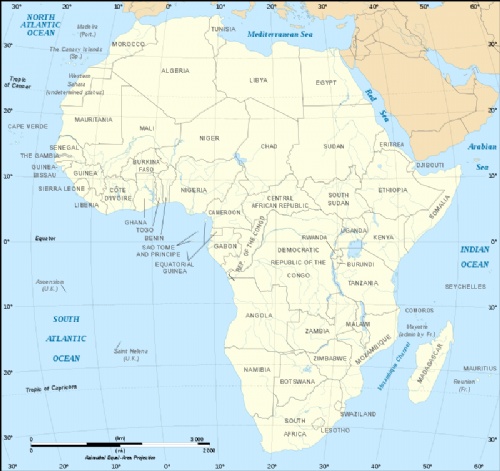Now in its twelfth year, Class 46 is dedicated to European trade mark law and practice. This weblog is written by a team of enthusiasts who want to spread the word and share their thoughts with others.
Click here subscribe for free.
Who we all are...
Madrid, Africa and beyond: an update
 Mariëtte Du Plessis of the MARQUES International Trade Mark Law & Practice Team summarises the latest developments regarding the Madrid Protocol in Africa:
Mariëtte Du Plessis of the MARQUES International Trade Mark Law & Practice Team summarises the latest developments regarding the Madrid Protocol in Africa:
Brand owners have for some time been focused as the accession of African countries as European brand owners are well versed in the Madrid System and have used it with great success.
African countries have generally been slow in acceding to the Madrid System, and it has not been without complications. Currently, the following 22 African countries/jurisdictions can be designated in terms of the Madrid System: Algeria, Botswana, Egypt, Gambia, Ghana, Kenya, Lesotho, Liberia, Madagascar, Malawi (most recently), Morocco, Mozambique, Namibia, OAPI, Rwanda, Sao Tome & Principe, Sierra Leone, Sudan, Swaziland, Tunisia, Zambia and Zimbabwe.
In order for the Madrid system to function effectively in Africa, the following key requirements need to be met:
- National trade mark or IP laws should expressly recognise the validity and enforceability of international registrations. Preferably, regulations should also be implemented to offer guidance and direction to Registry officials on how to process Madrid designations;
- The national IP Office should process, examine and publish all Madrid designations and indicate any objections to WIPO within the strict timelines (12 to 18 months);
- The IP Office should maintain a single (digital) trade marks register which contains national and international registrations.
Of the member states, only four countries meet the criteria above, namely Kenya, Mozambique, Morocco and Tunisia. The more recent accessions involve Malawi and Namibia. These two countries have made big strides during the last quarter of 2018 aiming to amend their national legislation and local registries are working hard to comply with the requirements under the Madrid System. I touch briefly on these developments.
Malawi
On 24 October 2018, the notice of commencement in respect of the Trade Marks Act no 2 of 2018 (the New Act), was published in the Malawi Gazette Supplement. In terms of the notice the new Act came into operation on 1 October 2018.
The New Act makes provision for the Madrid Protocol (Banjul Protocol/ARIPO applications). Malawi deposited its instrument of accession to the Madrid Protocol with WIPO on 25 September 2018 containing the following:
- the declaration extending the refusal period to 18 months, making it possible to notify refusals based on opposition, after the expiry of that period;
- the notification indicating that Malawi requires a declaration of intention to use the mark when Malawi is designated in an international application or a subsequent designation of the Common Regulations under the Madrid Agreement and the Madrid Protocol;
- the notification indicating that the recording of licences in the International Register shall have no effect in Malawi. Consequently, a licence relating to an international registration should be recorded in the national register of the Malawian Registry in order to have effect.
The Madrid Protocol, this declaration and the notifications, will become enforceable on 25 December 2018.
There are reservations about the New Act coming into force without new regulations setting out the procedure to deal with applications for service marks, collective marks, geographical indications and non-traditional marks. That being said, new acts have come into operation in a number of other African countries before being gazetted and/or before new regulations have been published.
Namibia
As long ago as 2012 a new Industrial Property Act no 1 of 2012, which gave effect to International Registrations designating Namibia, was published. No enabling regulations were, however, published.
After much anticipation, the Industrial Property Regulations were finally published in the Namibian Government Gazette on 1 June 2018. As a result, the new Industrial Property Act no 1 of 2012 came into operation on 1 August 2018. Provisions are now in place for multi-class applications and applications to be filed in terms of the Madrid Protocol and the Banjul Agreement (ARIPO). In addition, the Registry has dedicated specific personnel for purposes of processing Madrid and ARIPO publications.
The challenge ahead
The challenge for both registries is to ensure that the Madrid applications are examined within WIPO’s strict timelines to ensure that brand owners can enforce their rights in these countries.
We will continue to monitor developments in Malawi and Namibia.
Mariëtte du Plessis is a Partner of Adams & Adams and a member of the International Trade Mark Law and Practice Team
Posted by: Blog Administrator @ 10.38Tags: Madrid System, Africa, Malawi, Namibia,


 Sharing on Social Media? Use the link below...
Sharing on Social Media? Use the link below...Perm-A-Link: https://www.marques.org/blogs/class46?XID=BHA4697

